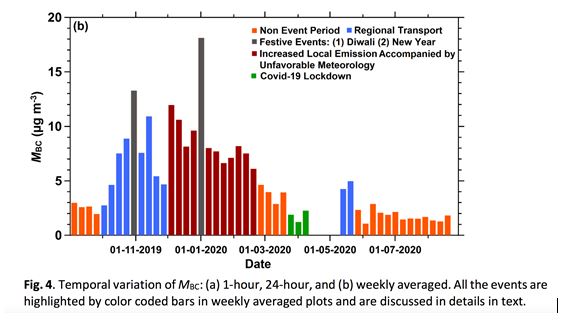Measurement of Black Carbon Aerosol in Delhi
Measurement of particulate matter (PM) constituent such as black carbon (BC) over urban sites is critically important owing to its adverse health and climate impacts. However, the impacts associated with BC are poorly understood primarily because of the scarcity and uncertainties of measurements of BC. Here, we present BC measurement at an urban site of Delhi using a characterized continuous soot monitoring system (COSMOS) for a year-long period, i.e., from September, 2019 to August, 2020. This measurement period covers events, i.e., period of crop residue burnings from nearby states, festive events, e.g., Diwali and New Year, and first COVID-19 lockdown period. Effects of these events combining with local emissions and meteorological conditions on BC mass concentration (MBC) are investigated to find the possible cause of severe pollution levels in Delhi. Winter season (December to February) is observed to be the most polluted season owing to increased local emissions and non-favorable meteorological conditions. Regional emission from crop burning in nearby states during October and November is the main contributing factor for increased pollution in this postmonsoon season. Significant decrease in MBC due to COVID-19 lockdown is also observed. MBC in summer and monsoon are lower as compared to other seasons but are still higher than mean MBC levels in several other urban cities of different countries.
Proper mitigation steps should be taken to control high level of pollution especially in postmonsoon and winter seasons. These could be control over biomass burning (crop burning) in nearby states during October and November and controlling local emission sources (open burning to fight cold, vehicular emission) in winters. Several initiatives have been taken to control crop residual burning in nearby states. New agricultural machinery like happy seeder and super straw management system are promising innovations which can potentially alleviate the crop-residue burning issue. However, not much focus has been given to control local emission sources in winters. Furthermore, implementation of ban on crackers is required to control emissions during festivals like Diwali and New Year. More rigorous study primarily focused on quantification of local emission source contribution to overall BC pollution (traffic, local open burning in winters and cracker burning) in Delhi is the need of the hour.
Ref :Arpit Malik, Shankar G. Aggarwal, Sho Ohata, Tatsuhiro Mori, Yutaka Kondo, P. R. Sinha, Prashant Patel, Baban Kumar, Khem Singh, Daya Soni, Makoto Koike (2022), Measurement of Black Carbon in Delhi: Evidences of Regional Transport, Meteorology and Local Sources for Pollution Episodes, Aerosol and Air Quality Research (AAQR), https://doi.org/10.4209/aaqr.220128.



